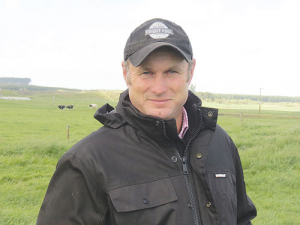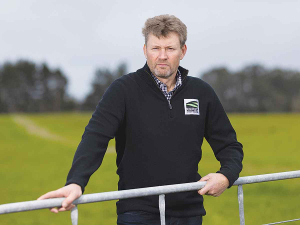The business, owned by the OB Group with interests in the North and South Islands, was visited by people attending the recent Grasslands Association conference. Peter Burke reports.
Three dairy farms operate in the windswept area of Santoft, along the coast near Whanganui, each with an average of 1100 cows. Collectively the farms produce 1.3 million kgMS on 1400ha, about two-thirds of it irrigated.
They also have another farm now being converted and expected to be in full production within 18 - 24 months.
Before the OB Group took over the land it was a mixture of extensive sheep and beef farming, a feedlot operation and forestry. In its previous life, about four people worked this land; now there are 40.
Stu Taylor has managed the farms for about eight years. He was brought up on a dairy farm in Northland, did an agricultural degree at Massey University, then after an OE worked for JD and RD Wallace in Waikato before coming to join the OB Group. He has been a scholar in the Kellogg Rural Leadership Programme.
Interesting to the Grasslands visitors was the way the land was and is being converted from low-producing sandhills to highly productive dairy land, and there is no doubt that irrigation is a huge part of this.
“The first stage,” says Taylor, “is to strip the soil and organic matter off the sandhills and set it up in piles or wind-rows. Then heavy machinery is used on the sandhills to flatten them or contour their shape; the soil and organic matter are returned and the ground is levelled.
“This work builds topsoil and sequesters carbon because the limiting factor in that country is the lack of organic matter in the soil. We use a combination of techniques -- drilling only and growing crops such as kale, sorghum and red and white clovers.”
The land being converted at present is 390ha; about 200ha will be irrigated. Looking at the farm now, the irrigators seem to stretch on forever, each 300m long. Taylor says they are yet to decide whether this land will become part of the milking platform or be used as a run-off block.
Once the organic matter has built up in the soil, Taylor and his team plant tall fescue and broome; both especially suit dryland farming and are better for production and persistence, are deep rooted and are efficient in using soil nutrients. Taylor believes the deeper rooting pastures also speed up the development of organic matter in the soil and carbon sequestration.
Some of the land on the new farm is already growing grass, other parts have newly sown kale.
Taylor’s management style accounts for the development of the new farm and the full production on the others. His focus is on people management, something he learned from his parents.
“When I was growing up I used to watch my parents bringing people into our family, caring for them, training them and helping them get where they needed to be. This is nothing new, we’re just replicating what agriculture has always been about; the difference is we’re doing it at scale rather than as a family operation.”
His management philosophy is set out in a paper he wrote on his Kellogg course, but Taylor was practising this long before then. His paper noted that while dairy farmers seem happy to spend money on consultants on the physical aspects of their farms, they baulk at spending it on human resource management. “Cows and grass are easy. With people, you’re never really sure what you will get. Take as long as it takes to get the correct person; it is not just a job to get done. Only choose the best and take your time employing people. Remember that the desperate employ the desperate.”
Taylor says many farmers don’t like the HR part of their business, yet employing the right staff makes all the difference to the success or failure of a business.
On the farms he runs, Taylor does it differently from others. His mantra is to seek innovation and good ideas, and to create a workplace that is community focused.
Forty people work on the farms but not everyone works full time.
“Flexibility and fitting the business around good people’s lives is what counts,” he says. “We have job sharing between husbands and wives. We all know society has changed and we want to adapt to that change.
“[In former times] when wives were at home -- and at times not enjoying life -- they often wanted to share the childcare and work roles, have adult time and still have an active role at work; and men wanted to be more active with their children. So balancing home/work life makes sense. I also have a student who works four days and then spends three at university.”
Taylor says all but the most untrained junior staff members are paid at least $20 an hour; higher wages attract better staff whose higher performance results in higher profits for the company. They also have a roster system that allows people adequate time off and they have an absolute limit on the hours any staff member may work in a week. “This is 58 but we target 50,” he says.
• Stu Taylor’s management ideas can be seen on a website he runs www.millenniumfarming.co.nz
















